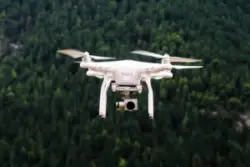
In 2015, a Kentucky man was arrested for shooting down a drone that was flying over his home. The Hillview man cited privacy concerns, but was arrested and charged with first degree criminal mischief and first degree wanton endangerment. The man reported that the drone was hovering over his teenage daughter, who was sunbathing in the backyard of his home. The owner of the drone claimed that he was flying the small machine to get pictures of his friend’s home, and that the device cost him over $1,800.00. Criminal charges were later dismissed due to witness testimony that the drone was flying below the trees.
Nevada Drone Laws
This has not been the only incident involving a drone shooting. In fact, people have done this in New Jersey and California, too. It is illegal, however, and offenders are getting arrested. Even if the drone is hovering over your personal and private space, you are likely violating Nevada law if you shoot the drone down over your land.
In 2015, the Nevada legislature passed dozens of laws regulating the use of commercial and recreational drones. Some of the regulations include making it a misdemeanor to fly a drone less than 250 ft. over a property. It is also prohibited to do trick flying over people. Drones are mandated to be operated below 500 feet and within the operator’s line of sight. Lastly, drones cannot operate within 500 feet of critical facilities. In other words, they cannot operate near government buildings or power plants and they cannot also be operated within five miles of an airport.
What to do if You See a Drone Overhead
If a neighbor or someone else is flying his or her drone over or around your property and refuses to stop, you cannot legally shoot the device down from the sky. There are things, however, that you can and should do to try to resolve the problem.
First, look into your local city ordinances or even Nevada state law to see if the person—and his or her drone device—has violated any laws. These may include peeping tom laws, noise ordinances, trespass, private nuisance, or invasion of privacy.
- Trespass: Typically, homeowners own the immediate air rights surrounding the top of their home. How high up in the sky this ownership goes, however, has yet to be settled;
- Private nuisance: If the presence or sound of the drone is disrupting the quiet use and enjoyment of your home, you may have a cause of action;
- Invasion of privacy: Unlike in public spaces, people generally have a right to privacy on their own property and this includes photographing or filming you in your home or on your land.
Nevada Drone Law Attorneys
If one of these has been violated, you may be able to bring a civil action against the drone’s owner and/or operator. That being said, damages available in this type of civil action may be limited unless you can prove financial or other damage due to the drone. If you or someone you know has any other legal questions, contact the skilled attorneys at H & P today.




